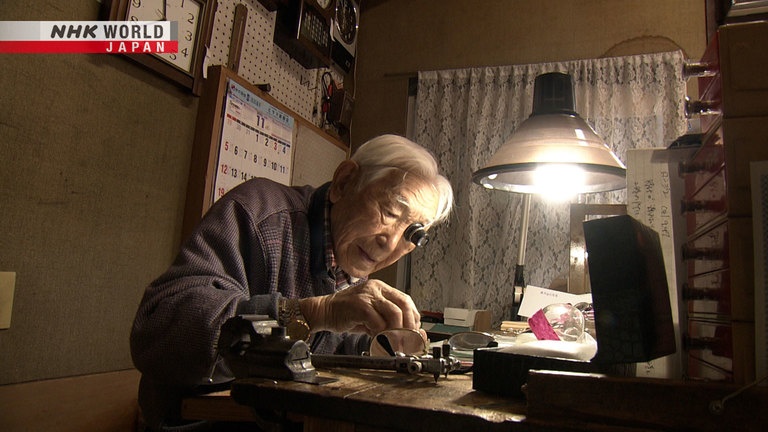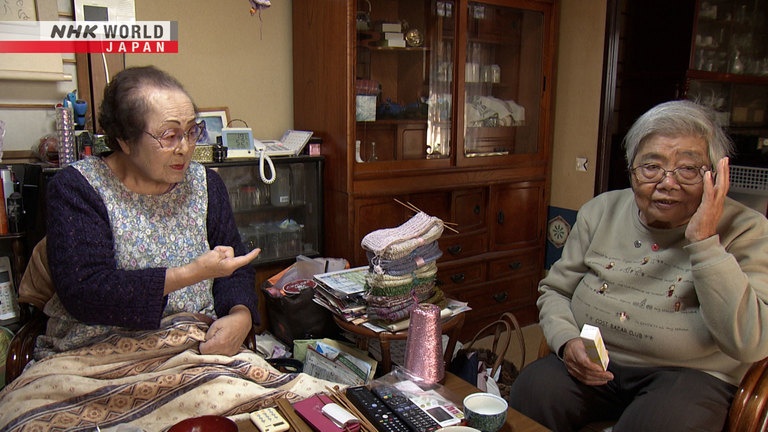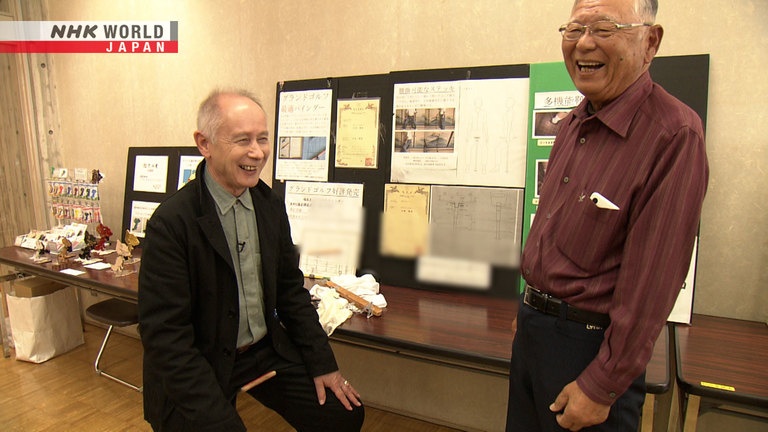Active Seniors
*First broadcast on January 4, 2024.
While Japan's population ages, many "active seniors" energetically participate in work and hobbies. An 88-year-old programmer and 104-year-old timepiece repairer show the secrets of senior success.



Transcript
Japanology Plus
Hello, and welcome to Japanology Plus.
I'm Peter Barakan.
Our theme for today is “active seniors,”
which refers to people aged 65 or older,
who are participating actively
in work or leisure activities.
That definitely includes me.
I'm in Fukui, a quiet coastal city which
has a large number of active seniors,
many of them working without
any need of assistance or care.
Active seniors are becoming
a hot topic now, globally.
On today's program,
we'll meet a few of them,
learn about their roles in society,
and maybe even discover
the key to a long, healthy life.
Active Seniors
- Good morning Horiuchi-san.
- Morning.
- Nice to meet you.
- Nice to meet you too.
Good morning.
Thanks for having me.
Horiuchi Yuko is an expert
on gerontology, the study of aging.
She lectures and consults
on the subject of active seniors.
Now today we're talking
about active seniors,
but is there an official definition
of what an active senior is?
There isn't, but it usually refers
to active people aged 65 and over.
They're motivated by work and hobbies.
They personally seek out new challenges
and enjoy finding new communities.
The term refers to
energetic people like that.
Why is it that there's so much attention
being given now to active seniors?
Globally, aging populations
will increasingly be a concern.
Active seniors can help to address
a potential labor shortage.
There are financial benefits too,
such as a reduction
in their care and health costs.
Plus, earning a bit of money helps
active seniors enjoy their lives.
So that's important for them.
Japan has an especially large
population of active seniors.
There are thought to be
around nine million of them,
and today we're going to meet some.
The first active senior we'll visit lives
in Fukushima, in northeast Japan.
Hello. Thanks for meeting us.
It's very nice to meet you.
Horino Tomoko is 100 years old.
You're wearing makeup.
I never know who I'm going to meet.
So I make sure to put on makeup every day.
It's part of my daily routine.
Horino actually sells cosmetics.
She's going to show us
how she goes about her day.
Heading out?
Yes.
Where to?
The office.
She makes the journey once a week.
First, she takes the bus.
It's a 15-minute ride.
Then, after two kilometers in a taxi,
she arrives at her office.
There's a steep staircase,
which she climbs unassisted.
Now 100 years old, Horino has
been selling cosmetics for over 60 years.
Her job title is “beauty director.”
She was born in 1923.
At age 22, shortly after
the Second World War ended,
she married Horino Keiichi.
I remember something
my husband told me back then.
He said you should always
be careful about the way you look.
His words sparked an interest in makeup,
and at the age of 37,
Horino began selling cosmetics.
Some customers even visit
her home to make a purchase.
Here. This is for you.
Thank you.
She has a blemish and wanted
to do something about it.
She's like a friend or a mother
to us customers.
She's just amazing. One of a kind.
Her popularity is reflected
in lifetime sales figures
that are over one hundred million yen!
In August 2023, she was awarded a
Guinness World Record for being
the oldest female beauty advisor.
Horino says that good food
is the key to her health.
She eats balanced meals:
rice and six side dishes.
I have 150 grams of rice every time.
I don't even need to measure it.
Any dislikes?
No! I eat everything.
What are her ambitions?
I want to carry on working as hard
as I can until the very end.
That's my goal.
That's what I want to do.
I mean, it's so much fun!
I just love what I'm doing!
Next, we're going to meet Wakamiya Masako,
an 88-year-old programmer in Kanagawa.
She developed a doll-themed
game aimed at seniors.
Below are hina dolls.
Dolls like this are traditionally
displayed in the home in early March.
Put them in their proper spots and...
Simply splendid work!
Wakamiya started coding at the age of 81.
It took her only six months
to create this game.
Here at her home, she shows us
the VR headset that she uses for fun.
One of the things you can
do is play table tennis.
The ball comes from over there,
and you hit it back.
The headset isn't her only gadget.
I often use a smart speaker.
This smart speaker contains a virtual
assistant that answers questions.
How do you cook jelly ear mushrooms?
Cut them up. Eat them raw
or in a salad, stir-fry, or soup.
The device shows recipes and acts
as a conversation partner.
Wakamiya was born in 1935
as the youngest of three children.
From an early age,
she was both competitive and curious.
After high school,
she worked at a major bank.
At 50, she became the first woman
to take a management role at the bank.
After retiring, she taught herself new
ways to use a computer—and later, coding.
She's now an “IT evangelist,”
promoting technology.
Each year, she gives around
85 lectures on the subject.
I think we should all
be proactive about the future.
It's also important to embrace
creativity in our lives.
Wakamiya's motto is that
it's never too late to learn.
And she herself is always
eager to try new things.
Next, we're heading
to a clock store in Fukui.
It's run by Japan's oldest
timepiece repair specialist.
Hello.
Hello.
His name is Ishida Yoichi.
Sorry to disturb you at work.
May I ask how old you are?
This year...it's November, yes?
Next month I turn 104.
Whoa, and you're still working.
My birthday's in December.
Congratulations.
Ishida specializes in repairing
clocks and watches.
These ones are all waiting to be fixed.
People send items that even
the manufacturers can't mend.
Parts for old products
are often difficult to find,
and even major companies can't help.
For many people,
Ishida is their last hope.
I'm running out of space on my desk.
Yesterday, this came from Okinawa.
It means a lot to the person who sent it.
Ishida believes there is
no timepiece that can't be fixed.
He never gives up on a project.
This is a 60-year-old clock
with a broken pendulum.
Ishida traces the fault to a tiny
component in one of the gears.
This three-millimeter metal
part has worn down,
and a replacement is not available.
Most repairers would give up.
But…
I'm going to make a new one.
Ishida makes a new part by hand,
from store-bought wire.
He uses several files
and gradually shapes the metal.
Then he checks it against
the original hole.
If it's off by a tenth of a millimeter,
the pendulum won't move.
Ishida checks and adjusts
the part over 50 times.
At last, his work is done.
A complex shape,
created from ordinary wire.
It's a stunning display of craftsmanship.
Good.
Can't call it a clock if it's not moving.
Another successful repair.
When Ishida was 15,
he got a job at a local clock store.
During the Second World War,
he was a mechanic.
His skills were used to repair aircraft.
After the war, he started his own
business repairing timepieces.
And that's been his job for over 70 years.
However, it isn't his
only area of expertise.
Every morning, I lift this.
What is that?
It's for shot put.
Weighs three kilograms.
Whoa.
I only started recently.
Ishida saw a shot-put record in
the newspaper, and decided to beat it.
At 96, he set a new Japanese
record in his age bracket.
I want to be the best at everything I do.
I've just got to be number one.
Second place is no good.
I always have to be the best.
We asked Ishida about
the secret of his good health.
First thing in the morning...
I spend an hour doing a massage.
Ahh.
My head and ears.
My ears...are very important.
So I massage them.
- By yourself?
- Yes.
Then I move my eyes side-to-side
and up-and-down.
I move them around.
When are you happiest?
Well, I receive a lot
of broken timepieces.
When I fix one and send it back,
I'll get a phone call.
To thank me.
Customers will tell me that my work
made their whole family happy.
Have you considered retiring?
No. When I move on to the next world,
that's when I'll stop.
Ishida has his sights set on
being the oldest person in Japan—
and working is a key part of that.
Ishida-san was really
quite amazing, wasn't he?
I mean, to be that active at that age,
I was totally astounded.
In general, are there any characteristics
of Japanese active seniors
that makes them different
from those in other countries?
Well, I'd say they're uniquely
motivated when it comes to work.
As long as they have sufficient mobility,
lots of people in Japan want a job.
This graph illustrates that point.
In Japan, 40.2 percent of people
aged 60 and over want to keep working.
That's much higher than
the other countries surveyed.
In the West, on the other hand,
people typically want to stop working
and enjoy a comfortable retirement.
Why do you think it is that
Japanese people,
even after the age of 65,
want to keep working?
They want to feel connected to society.
They want to feel useful to someone.
We have this idea of “living to work.”
That's rightly criticized,
but people want to do
something worthwhile,
and work is an important aspect of that.
Work allows for communication
with a wide group of people.
It generates a sense of social identity.
And a lot of Japanese people
are just diligent workers.
Through new initiatives,
active seniors are even contributing to
a brighter future for the local community.
This is Kamikatsu in Tokushima.
It's home to around 1,700 people.
Over half are seniors,
and many have busy working lives.
The major industry here now is leaves.
They're collected in the mountains,
then shipped out for use as decorative
flourishes in Japanese cuisine.
In the past, the main industry
was mandarin oranges,
but poor harvests and depopulation
put the town's survival at risk.
How might elderly residents
use local resources
to breathe new life into the community?
The answer proved to be leaves.
A clever system alerts registered
farmers to incoming requests.
Those able to accept
the work respond online.
Three hundred and twenty
types of leaves are sold
earning two hundred
and fifty million yen per year.
That generates income for
the town as well as its residents.
The Kamikatsu leaf business is
a regional revitalization success story.
It continues to draw a lot of attention.
Here's some interesting data.
The vertical axis shows intelligence,
and the horizontal axis shows age.
There are two categories of intelligence.
The blue lines show “fluid intelligence.”
That's the capacity to perceive
and solve new problems.
When asked a question,
you can immediately answer.
That's the idea.
As the graph shows,
this ability tends to peak at a young age,
and slowly declines after your 20s.
The red lines, meanwhile, show what
is called “crystallized intelligence.”
That refers to knowledge and experience
that people steadily accumulate
as they go through life.
That kind of mental ability.
The elderly have a big advantage
in this department.
In some people,
crystallized intelligence does decline.
But that decline is often small,
or hard to measure.
A craft skill, for example.
Yep. Uh huh.
Even as people get older,
this crystallized intelligence can
be harnessed to take on new challenges.
Existing mastery of one
or two time-tested skills
may be extremely helpful
when tackling a brand-new task.
That's the benefit of past experience.
As the population ages,
efforts are being made to increase
the number of active seniors.
In Fukui, club activities
are being promoted
as ways to help people make friends
and feel a sense of purpose.
We'll take a look at one unusual club.
Hello.
Hello.
Thank you for coming.
So what kind of a group do you have here?
This is the Fukui Invention Club.
We're a non-profit organization.
We nurture creativity in the local area.
It's quite a lofty goal, I suppose!
The members of this club
come up with new solutions
to inconveniences they
experience in everyday life.
They meet once a month
and the average age is 75.
Do you all work on
inventions by yourselves,
or do you get together and talk
about things that you want to invent,
or how does it work?
We mostly work alone.
But then people share their ideas,
and we all discuss them together.
Then we refine and improve each project.
That's how this group operates.
So what have the group's members invented?
Take a look at this...
It's a cane.
A walking stick.
And when you get tired...
you can open it up.
Ah, OK.
You can have a rest.
I've seen people at rock festivals
with similar things.
And when it gets dark, there's a light.
Oh, OK.
We patented it.
Oh wow, OK.
Can I have a try? OK.
So that's the front.
Yeah, that is quite good.
I might buy one of them!
Next, a band that prevents
socks from slipping.
When you're wearing boots,
your socks can get dragged down.
They get pulled under your heel.
But this band secures socks very firmly.
You can use it with any kind of socks.
It works very well.
Next, a trash bag stand for sinks.
It has a simple design,
and can be placed almost anywhere.
Here's a non-slip device that makes
it easier to open plastic bottles.
And a range of removable tapes
that make face masks look more stylish.
Do you get a feeling of satisfaction
from creating something
that gives pleasure to people?
Being useful is a fantastic feeling.
And doing this makes us feel like
we're not getting any older!
It keeps us feeling young.
And it's really good for the brain.
At my company,
we had mandatory retirement at 65.
I needed something to do
in the second phase of my life,
and so I joined this club.
And now, it's become a source of real
pleasure in my day-to-day life.
I love it.
The birth rate in Japan
is continuing to fall.
And the number of seniors in Japanese
society is getting bigger all the time.
Obviously, the role that these active
seniors will play in Japanese society
is going to be a major one.
With the declining birth rate,
the term “aging society”
isn't used in a positive way.
It brings to mind issues such as nursing,
healthcare, and lower tax revenue.
But aging itself, actually living
a long life, is a beautiful thing.
To increase the number of active seniors,
to help them find work
and pursue energetic, enjoyable lives—
that, I would say, is very meaningful.
Ishida-san the watchmaker, or repairer,
I suppose, was just exceptional.
I don't think there are an awful
lot of people like him.
So we have to see him as an exception.
But the people we've been talking to here
have all come up with really good,
interesting, clever ideas
to deal with very everyday
kind of problems.
And it seems to me that,
because there's a group,
and because they come together—even
if it's only once a month—
they kind of bounce ideas off each other,
and they start thinking in ways that
will help you to solve problems.
And that's basically what we all have
to do in our daily lives anyway.
So to be able to contribute to society
in that way, at an advanced age,
I mean, they were saying it gives
them self-satisfaction as well.
But it also gives satisfaction
to a lot of other people,
so it's a real win-win situation.
It's all about community.
If they had been sitting alone at home,
thinking without other people,
their good ideas wouldn't have grown
and developed into these inventions.
The community and the government
can provide assistance.
And you can take care of yourself.
But the focus these days is
on taking care of each other.
Taking care of yourself
is all well and good.
But recently, the Ministry of Health,
Labour and Welfare
has been stressing mutual support
among friends and neighbors.
At this club, you can see
how people have a great time
thinking about each other's ideas
when they meet up once a month.
And it really does seem to
be a good way to think things up.
The key idea is mutual support
as a feature of everyday life.
On the path ahead,
I am convinced that this kind of approach
is going to play a key role in
keeping seniors active and happy.
Yeah, community really does
mean a lot, doesn't it?
Even a small community.
Yes.
Thank you very much.
Thank you very much.